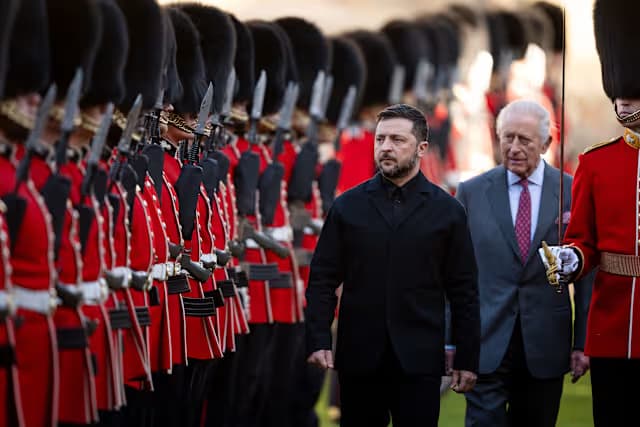We're loading the full news article for you. This includes the article content, images, author information, and related articles.
As Ukraine’s president lobbies for crucial long-range weapons, the protracted war continues to exert pressure on the Kenyan economy through volatile global food and energy prices.

Ukrainian President Volodymyr Zelenskyy met with more than 20 European leaders in London on Friday, October 24, 2025, making an urgent plea for advanced long-range weaponry to counter escalating Russian attacks. The high-stakes summit, hosted by UK Prime Minister Keir Starmer, took place against a backdrop of faltering international military and financial support for Kyiv and a renewed Russian assault on Ukraine's critical energy infrastructure ahead of winter.
The hybrid gathering of the “Coalition of the Willing” included in-person attendance from NATO Secretary General Mark Rutte, Danish Prime Minister Mette Frederiksen, and Dutch Prime Minister Dick Schoof, with other leaders participating virtually. Discussions centered on increasing pressure on Moscow, with Starmer signaling strong UK support for providing Ukraine with greater long-range capabilities to strike Russian targets deep behind the front lines. "I think there's further we can do on capability, particularly... long-range capability," Starmer stated during the meeting.
President Zelenskyy's visit comes at a critical juncture. Recent data from the Kiel Institute for the World Economy released on October 14, 2025, showed a sharp decline in military aid to Ukraine during July and August 2025, despite new NATO initiatives. This slowdown in support coincides with a methodical and increasingly effective Russian campaign targeting Ukraine's power grid. Russian drone and missile strikes have recently caused significant power outages in major cities, including Kyiv and Chernihiv, prompting Zelenskyy to warn that Russia aims to create a "humanitarian disaster" this winter by weaponizing the cold. According to the International Energy Agency's October 22, 2025 report, Russian attacks on energy infrastructure are growing in scale and sophistication, posing a severe threat to Ukraine's ability to provide heating and electricity.
The UK has sought to lead by example, recently accelerating a missile-building program to deliver over 100 extra air defense missiles to bolster Ukraine's defenses. This follows Ukraine's successful use of a British-supplied Storm Shadow missile to strike a Russian military plant in Bryansk. However, other key allies, notably the United States, have remained hesitant to supply equivalent weapons like Tomahawk cruise missiles, a topic of ongoing debate.
While the conflict rages thousands of kilometers away, its economic consequences continue to be felt across Kenya and East Africa. The war has persistently disrupted global supply chains for essential commodities, including grains, fertilizers, and fuel, contributing to inflation and a higher cost of living. In an August 26, 2025 statement, President William Ruto acknowledged the war's immense impact on the disruption of these critical supply chains. Studies by the World Bank and other institutions have consistently shown that price shocks in global fertilizer and fossil fuel markets, driven by the conflict, have significantly affected Kenya's economy, with low-income households being the most vulnerable.
Although global food commodity prices have seen some moderation from their peak in March 2022, they remain volatile. The FAO Food Price Index remains sensitive to geopolitical tensions, and rising global energy prices continue to affect transport and production costs, feeding into higher prices for Kenyan consumers.
Diplomatically, Kenya has maintained a stance rooted in the principles of the United Nations Charter. President Ruto, on August 26, 2025, reiterated Kenya's position: "We strongly believe in the UN Charter, and especially in national sovereignty and territorial integrity... dialogue, not war, is the path to peace." This echoes the powerful statement made by Kenya's then-Ambassador to the UN, Martin Kimani, at the outset of the full-scale invasion, where he invoked Africa's colonial history to condemn the violation of borders. However, a foreign policy paper adopted by Parliament in June 2025 indicated a shift toward a more neutral, non-aligned stance, aligning with the positions of the G77 and the African Group.
In London, leaders also focused on tightening economic sanctions and utilizing frozen Russian assets to fund Ukraine's defense and eventual reconstruction. Prime Minister Starmer vowed that the coalition would act to take Russia's oil and gas “off the global market” to “choke off funding for Russia's war.” The European Union has struggled to reach a firm decision on using an estimated €140bn in frozen Russian central bank assets, a point of contention Zelenskyy has repeatedly urged allies to resolve. The outcomes of the London summit are intended to send a clear signal of renewed resolve to Moscow, demonstrating that despite challenges, key international partners remain committed to ensuring Ukraine does not face Russia's aggression alone.
Keep the conversation in one place—threads here stay linked to the story and in the forums.
Sign in to start a discussion
Start a conversation about this story and keep it linked here.
Other hot threads
E-sports and Gaming Community in Kenya
Active 9 months ago
The Role of Technology in Modern Agriculture (AgriTech)
Active 9 months ago
Popular Recreational Activities Across Counties
Active 9 months ago
Investing in Youth Sports Development Programs
Active 9 months ago